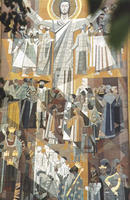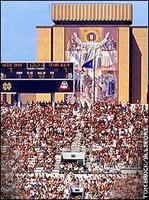Sports, Prayer, and Religion
Q: Jesus is acclaimed after touchdowns, home runs, and other accomplishments in athletics. Athletes pray in huddled groups and in various fellowships. Is God interested in these contests? Does He determine the victor? For what do (or should) athletes pray?
 A: While public testimony of Christian faith is part of the Christian life, religious exhibitionism is countered by Christ’s command to not make a public spectacle of prayer. At the same time, He also warns against praying for wrong reasons or toward the wrong goal, as we read in Matthew 6:1-15.
A: While public testimony of Christian faith is part of the Christian life, religious exhibitionism is countered by Christ’s command to not make a public spectacle of prayer. At the same time, He also warns against praying for wrong reasons or toward the wrong goal, as we read in Matthew 6:1-15.The content of prayers heard by and pleasing to God is summed up in these verses, which include what we call the Lord’s Prayer or Our Father. Spiritual blessings predominate in this prayer given by Jesus to His Church. “Daily bread” sums up our physical blessings, including, as the Lutheran Small Catechism states, “everything that has to do with the support and needs of the body, such as food, drink, clothing, shoes, house, home, land, animals, money, goods, a devout husband or wife, devout children, devout workers, devout and faithful rulers, good government, good weather, peace, health, self-control, good reputation, good friends, faithful neighbors, and the like.”
Daily bread is part of the life of the athlete, just as it is for each of us. Not all receive all these blessings, nor each in the same measure. None of these blessings sounds remotely like contests of strength or skill — although athletic contests may be how one is allowed to receive daily bread. However, aside from people asking Him to be able to perform to the best of their ability, I do not think that God normally “takes sides” in such competitions. Of course, He may have some extraordinary reason, and athletes who so ask may not be engaged in meaningful prayer.
What do I mean by this? I don’t think that God favors the team with the most Christians or the individual who calls most passionately on the Lord for special strength, skill, or success. Yet if it serves His purposes of either bringing judgment, leading someone to the faith, or building more fervent belief, then God may decide to take a hand.
If religiosity and fervent prayer lead directly to success in athletics, why do the small Christian colleges not regularly slay the secular Goliaths? Specifically, why didn’t my little Lutheran college in Winfield, Kansas sweep away its foes on the soccer field? After all, we fielded a team of mainly theological and parochial education students. We prayed fervently and attended church regularly; why didn’t we get some divine help?
Furthermore, what appears on the surface to be part of Christian religion is, at its heart, often the religion of superstition. People pray, sign themselves with the cross, or attend team chapel services not because of belief in God, but because they trust in the ritual. One example: A recent edition of Sports Illustrated included information about a baseball player who sent his bats(!) to chapel, even if he didn’t attend. His own personal belief that such an action has benefit may provide a psychological lift. However, nothing in God’s Word indicates that such behavior is pleasing to the Lord or rewarded by Him.
 Perhaps nothing better signifies ongoing confusion of sports and religion than the “Word of Life” mosaic mural on the Hesburgh library at the University of Notre Dame, as shown here. The image is intended to be one of Christ teaching and draws its title from John 1:1-5. Yet it was scarcely installed before receiving its unofficial moniker, “Touchdown Jesus.” You can see Him peering above the top of Notre Dame’s stadium, seemingly favoring the Fighting Irish.
Perhaps nothing better signifies ongoing confusion of sports and religion than the “Word of Life” mosaic mural on the Hesburgh library at the University of Notre Dame, as shown here. The image is intended to be one of Christ teaching and draws its title from John 1:1-5. Yet it was scarcely installed before receiving its unofficial moniker, “Touchdown Jesus.” You can see Him peering above the top of Notre Dame’s stadium, seemingly favoring the Fighting Irish.Thus, the story of David Gordon makes delightful irony. Coming in as a place kicker at the end of a game, with darkness closing in, Gordon recalled, “The gold from Touchdown Jesus was the only thing I could really see.” He went on to say, “I always pick a spot to aim at. And Touchdown Jesus was my spot.” The kick was on target and — well, you can read Notre Dame’s own Sports Observer for a bit more.
The more closely we look, the more we might be tempted to adjust Napoleon’s military maxim to the field of sports. He famously noted, “God fights on the side with the best artillery.” While this may not comfort the two-touchdown underdog in a game this weekend, it might just cheer up weary Christians as we battle sin, death, and devil through our days on earth. As Luther said in the hymn A Mighty Fortress, “For us fights the valiant One, whom God Himself elected.” The biggest and best Weapon in God’s arsenal remains on our side and we cannot lose.
Send email to Ask the Pastor.
Walter Snyder is the pastor of Holy Cross Lutheran Church, Emma, Missouri and coauthor of the book What Do Lutherans Believe.

1 Comments:
This is an excellent post. I will read it with my son. :)
Post a Comment
<< Home